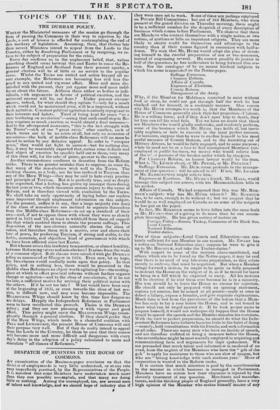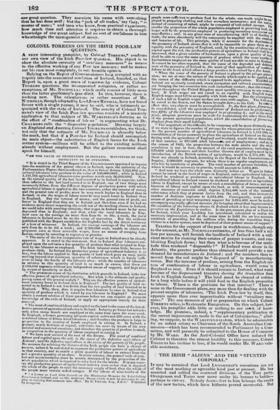DESPATCH OF BUSINESS IN TIIE HOUSE OF COMMONS.
AN examination of the Business-paper convinces us that the divisisn of employments is very little understood, or at any rate very imperfectly practised, by the Representatives of the People. It is manifest that some Members have undertaken much more than they can possibly accomplish, and that many are doing little or nothing. Among the unemployed, too, are several men of talent and knowledgeeand we should hope of industry also if they were once set to work. Seme of these are perhaps employed on Private Bill Committees; but out of 568 Members, who were present at the grand division on Thursday morning, there ought to be a sufficient number for the despatch of every description of business which comes before Parliament. We observe that there are Members who content themselves with a single notice, or two notices, of motions or bills on important subjects. They are more likely to obtain credit for themselves and advantage to the country than if their names figured in connexion with half-a- dozen. We wish that Mr. HUME would adopt the plan of devot- ing himself to the careful preparation of one or two measures, instead of engrossing several. He cannot possibly do justice to half of the questions he has undertaken to bring forward this ses- sion. See the catalogue of by no means kindred -subjects to which his name is appended on the Notice-paper.
Suffrage LIxtension. Chancery Reform. Affairs of Canada. Expenses of Election& County Reform. Management of the Army.
Why, if the Member for Middlesex contrived to exist without
food or sleep, he could not get through half the work he has chalked out for himself, in a creditable manner. One reason why Mr. Hume attempts too much is, that the Members of the House of Commons generally shirk their fair proportion of labour. He is a willing horse, and if they that spur him to death, they let him run till his wind fails. Yet we have no doubt that there are Members who would gladly undertake, and resolutely perform, some of the business which Mr. HUME lays holds of, but inevi- tably neglects, or fails to execute in the most perfect manner.
For instance, suppose that he were to confine himself to his most useful measure of County Reform, and to the ferretting out of Military Abuses, he would be fully engaged, and to some purpose;
while he need not be at a loss to find unemployed Members (un- employed in public business, we mean) who would relieve him
of the ot!.or portions of the burden under which he staggers.
For Chancery Reform, an honest lawyer would be the man. What iS 7.Ir. LYNCH about, or Mr. PHYME, OT Mr. POULTER?
Suffrage Extension. Mr. DuNcostee pretends to the manage- ment of that question : will he attend to it? If not, Mr. Leanest or Mr. ELPHI N SONE might relieve him.
Expenses at E.ections. Mr. HUME'S friend, 'Mr. HALL, would manage this subject con amore, with his Monmouthshire bills in his pocket.
Affairs of Canada. We had supposed that this was Mr. ROE- BUCK'S subject: why has Mr. HUME taken it ? Mr. ROEBUCK has, to be sure, enough to do without it ; but we suspect that he would be as well employed on Canada as on some of the subjects he has put on the paper. In fact, Mr. ROEBUCK seems to have fallen into the same fault as Mr. HUNIE—that of aspiring to do more than he can accom- plish thoroughly. He has given notices of motion on
Foreign Policy—Russia, Turkey, Commerce of the Black Sea. Local Courts.
National Education.
Timber-duties.
Two of these subjects—Local Courts and Education—are cer- tainly sufficient for one Member in one session. Mr. Ewser has a notice on National Education also: suppose he were to give it up to Mr. ROEBUCK, and take the Timber-duties ?
With respect to some of the matters above-mentioned, and others which are to be found on the Notice.paper, it may be said that there is no need of any laborious preparation, as they relate merely to motions, that must be negatived. But when a Member brings forward a motion, he ought to be quite as fully prepared to instruct the House on the subject of it, as if be moved for leave to bring in a bill which he expected to carry. All his motions will be abortive if he slur them over because he is in a minority. His aim should be to leave the House no excuse for rejection. He should not only be prepared with an opening statement, copious yet concise, but be armed at all points—ready at once to detect a fallacy, expose a blunder, and give requisite explanations. Much time is lost from the prevalence of the notion that a Mem- ber has only to lay a case before the House, and is not bound to know what can be urged against it. If he took proper pains to prepare himself, it would not cut requently happen that the House would be spared the speech and the Member abandon his crotchets. With the view to perfect preparation, he should do what the Inde- pendent Reformers have hitherto been too little in the habit of doing —namely, hold consultations with his friends, and seek ieformation on all sides. There are many men who have no facility of speech, and are therefore unfitted to bring a measure before the House, who nevertheless might be most usefully employed in acquiring and eommunicating facts and arguments for their spokesman. We are persuaded that much talent and informatim is rendered of no avail, from the neglect of the Members who have the" gift of the gab" to apply for assistance to those who are slow of tongue, but who are "hiving knowledge with each studious year." More of cooperation is wanted in the Reform ranks. It is certain that much attention is paid by the constituencies to the manner in which business is managed in Parliament. Members have no notion how their character is injured by the slovenly treatment of any question. Merchants and manufac- turers, and the thinking people of England generally, have a very high opinion of the Member who makes himself master of any one great question. They associate his name with somcithing that he has done well: the " jack of all trades," say "is master of none;' and :nen who know, from practical eatperience, how much time and attention it require to obtain a thorough knowledge of one great subject, feel no sort of con Vidence in him who attempts the rnanagement of many.



























 Previous page
Previous page